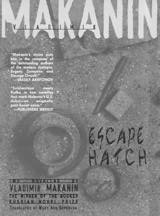Russian Escape Artist
Novella author Vladimir Makanin finds no solace in the near future
By Harvey Pekar
IN THE SECOND half of the 19th century, Russia produced an abundance of outstanding fiction writers. Dostoevski, Tolstoy, Turgenev, Chekhov and Gogol just begin a list that includes lesser-known greats such as Goncharov, Leskov and Garshin. Having become aware of these writers, I also learned of early 20th-century avant-garde Russian musicians (Stravinsky) and visual artists (Kandinsky) of equal stature and aesthetic daring. But where were the Russian literary experimenters of the post-1900 era?
At the time, I didn't know, because I hadn't developed much of an interest in the evolution of modernist literature. Eventually, I did get involved in the subject and found that Russia/U.S.S.R. had produced as many or more excellent modernist authors as any nation until 1935: Bely, Pilnyak, Zamyatin, Olesha, Khlebnikov, Bulgakov, Mandelstam. But these men had been silenced, and their works taken off the market so quickly by Soviet politicians that one had to dig hard to find them; they were unfamiliar to even most literary academics not specializing in 20th-century Russian writing.
From 1935 to 1985, Socialist Realism was the only acceptable literary style in the U.S.S.R. Following Stalin's death, there emerged a literary underground that produced some excellent novelists and poets, several of whom were jailed or exiled. Finally, with Gorbachev, censorship was lifted, but by that time, most Russian authors, having lost touch with evolutionary developments in world literature, were conservative or reactionary stylists.
They've been recovering lost ground, however, as Vladimir Makanin's Escape Hatch demonstrates. The book, which contains two dystopian novellas (written in 1991), indicates that, directly or indirectly, Makanin has been influenced by Evgeny Zamyatin, the author of We, a book that anticipated in great detail Brave New World and 1984. (Actually, Zamyatin's a better writer than Huxley or Orwell, who both appropriated details of We's plot.)
Zamyatin and Makanin (born 1937) also share a background in science and mathematics. Zamyatin worked for a while as a naval engineer, in fact. In the novella Escape Hatch, the protagonist, a mathematician named Klyucharyov, travels through a tunnel from a deteriorating aboveground city, where public order hardly exists, to an underground community where residents live comfortably and safely but seem on the edge of some crisis. The Long Road Ahead, set in a future Utopia, finds a young engineer traveling from Moscow to an isolated food-manufacturing plant in the steppes to install a machine he's invented.
BOTH WORKS display nightmarish, Kafkaesque qualities. Everyone in Escape Hatch seems terrified, waiting for the other shoe to drop. In The Long Road Ahead, the inventor is horrified to find that the plant he's visiting does not manufacture synthetic meat but actually slaughters cows, something considered barbaric in his society.
The inventor doesn't know what to do about the situation. He can't stay at the plant, but he's is afraid to leave, because, having been introduced to evil, he'd be a corrupting influence in Moscow. Eventually, he camps outside the plant on the steppe, keeping a bonfire going in hopes that a helicopter will see him and give him transportation to somewhere. Soon, he discovers that there are many people keeping similar bonfires going and calmly waiting--for what they do not know.
The Long Road Ahead has a story-within-a story construction. It turns out that the tale of the engineer has been made up by a narrator who appears in the middle of the novella and explains that he's composed it for his friend, Ilya Ivanovich, a schizophrenic who cannot bear to witness any living thing suffer. As the novella progresses, Makanin alternates between the two narratives, and the characters and events in each influence the other.
In these novellas, Makanin obviously draws on the experience of Soviet/Russian citizens now and in the recent past; the remote meat-producing plant, for example, could correspond to a prison in the Gulag archipelago. Makanin's works are allegorical, and it's difficult to discern where he stands on specific issues--possibly because he wants to provoke readers into asking questions rather than providing them with answers.
Makanin's protagonists are isolated and struggling with social, psychological, spiritual and political problems. Because he depicts their struggles so believably and poignantly, even in the context of fantastic plots, Makanin will appeal to a wide variety of readers. His stories can be dealt with on a number of levels. Even if you're not into speculating about the mysteries of the cosmos they may grab you, because Makanin, in addition to his erudition, is a top-notch storyteller.
[ Metro | Metroactive Central | Archives ]
This page was designed and created by the Boulevards team.

From Russia With Angst: In his two dystopian novellas, Vladimir Makanin wrestles with enigmatic nightmares.
Escape Hatch & The Long Road Ahead by Vladimir Makanin; Ardis Publishers; 193 pages; $24 cloth.
From the October 10-16, 1996 issue of Metro
![[Metroactive Books]](/books/gifs/books.gif)